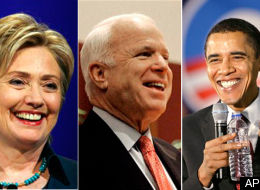 $110 million. Thats the combined amount that Sens. Barack Obama and Hilary Clinton have spent on TV advertisements to this point (CNN). John Kerry spent around $20 million to lock his presidential nomination from the democrats, and Obama has already tripled this amount spending nearly $70 million. Considering the race for a democratic presidential nominee is still not over, and that this $110 million does not include the republican party's spending, isn't this all a bit outrageous?
$110 million. Thats the combined amount that Sens. Barack Obama and Hilary Clinton have spent on TV advertisements to this point (CNN). John Kerry spent around $20 million to lock his presidential nomination from the democrats, and Obama has already tripled this amount spending nearly $70 million. Considering the race for a democratic presidential nominee is still not over, and that this $110 million does not include the republican party's spending, isn't this all a bit outrageous?The wild spending is indicative of the transformation in the role and power that media has on potential voters. Television has always been the best way to reach the largest audience, but now that more channels of communication have opened, such as online advertising, candidates have even more opportunities and places to funnel their money in attempt to "capture" potential voters. Campaigning used to be a way for a candidate to raise awareness about their prospective political agenda, but now seems like it is nothing more than a battle between candidates for face-time with upcoming voters. I understand that political campaigning is imperative to each candidates eventual success, but I believe that there should be some limit or cap on how much money a presidential candidate can spend on their campaign, which should be monitored by congress or some third party in order to ensure fair play.
Check out all the recent Presidential television advertisements here.
Regardless of how much money the democratic and republican presidential candidates spend on their campaign's, a winner will emerge who will be faced with the prospect to change the way the world views the United States. Hopefully the upcoming president will have learned from his predecessor's mistakes that economic and military might do not give a country the ability to successfully impregnate its views elsewhere. Solving international problems requires a multi-lateral approach, which means talking to your enemies, not just your friends. With a Democratic win, one of the first moves will be to close, or reconfigure, Guantanamo Bay. It would also be wise of the winner to be involved in a massive American and European re-engagement, including Iran and Syria, both of which are crucial in bringing peace to the region and helping the United States to hamper terrorist networks throughout the Middle East.
Although it seems as though there is no simple military solution in Iraq for the U.S., it appears that in the near future our involvement will be limited to protecting Iraq's oil supply and assisting Iraqi forces to prevent terrorist cells from growing/emerging. The presence of American troops will always be necessary, at least within the next ten to twenty-five years, but as the number of troops diminish in size we can rely more on outsourcing our aid to Iraq through private security forces like Blackwater. As China's economy continues to grow and eventually surpasses that of the United States, we will be forced to recognize that multilateral cooperation is not important, but essential to our survival and dominance. The decisions that the new President of the United States will be faced with soon after being inaugurated will shape the future of the world.
2 comments:
It's ridiculous how much money has been spent on political advertisements when the *real* election contest has not even begun! I support Barack Obama, but honestly there is relatively little in way of policy differences between him and Hillary Clinton. We could really use some more political diversity in Congress.
It's become prohibitively expensive for the average person to run for political office in the United States. It's no wonder that the majority of U.S. senators are millionaires.
Since you feel there should be a cap on Presidential political spending, how do you feel about the current public financing system? John McCain not only pioneered its creation but will be the first Presidential candidate to utilize it – limiting the amount of money he can spend. (But of course this is admittingly more out of necessity than principal) Barack Obama early last year pledged to do the same but after raising obscene amounts of money has now rescinded his pledge. I just wanted to know if this at all sways you one way or another.
Post a Comment